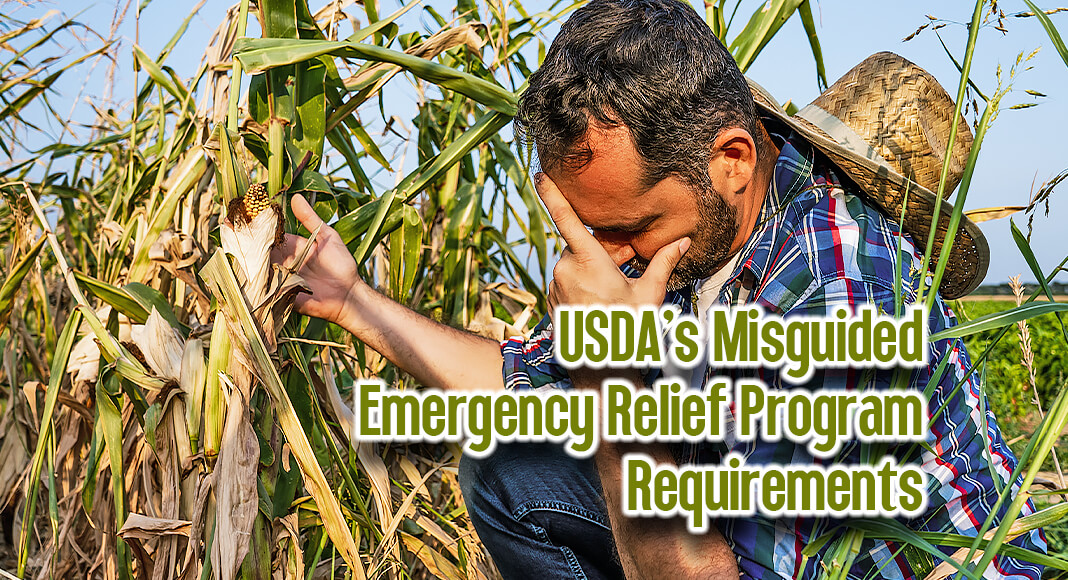
Texas Border Business
WASHINGTON, D.C. – U.S. Sens. Ted Cruz (R-Texas) and Roger Marshall (R-Kan.) along with Rep. Jodey Arrington (R-Texas) sent a letter to the United States Department of Agriculture (USDA) to express their concerns regarding the USDA’s discriminatory methodology for the Emergency Relief Program (ERP). Under the Biden administration’s 2022 ERP requirements, the purpose of the relief program is not to provide the greatest amount of relief to those farmers who’ve suffered the most from recent natural disasters. Rather, the Biden administration has decided payments should be based on a farmer or producer’s skin color and sex. This use of identity to decide who gets how much assistance is another example of this administration’s radical social agenda all under the cover of ‘equity.’ The USDA’s new methodology does not meet the needs of the agricultural community, and completely jeopardizing their ability to access the program.
In the letter the members wrote, “American producers have experienced significant losses, and the Administration has taken an approach that does not reflect Congressional intent. The current program does not provide needed assistance to full-time farm families that suffered the deepest losses, and in short, it misallocates limited but badly needed assistance.”
Cosigners of the letter include, Sens. Tommy Tuberville (R-Ala.), Deb Fischer (R-Neb.), Pete Ricketts (R-Neb.), Cindy Hyde-Smith (R-Miss.), James Lankford (R-Okla.), John Cornyn (R-Texas), and Representatives Ronny Jackson (R-Texas), August Pfluger (R-Texas), Frank Lucas (R-Okla.), Scott Franklin (R-Ga.), Jake LaTurner (R-Kan.), Jake Ellzey (R-Texas), Tracey Mann (R-Kan.), Mike Ezell (R-Miss.), Stephanie Bice (R-Okla.), Pete Sessions (R-Texas), Ralph Norman (R-S.C.), Dan Crenshaw (R-Texas), Nathaniel Moran (R-Texas), Michael Guest (R-Miss.), Lance Gooden (R-Texas), Dan Newhouse, (R-Wash.) Keith Self (R-Texas), Julia Letlow (R-La.), James Baird (R-Ind.), Troy Nehls (R-Texas), Byron Donalds (R-Fla.), John Rose (R-Tenn.), Adrian Smith (R-Neb.), Barry Moore (R-Ala.), Morgan Luttrell (R-Texas), Dusty Johnson (R-S.D.), Brian Babin (R-Texas), Rick Allen (R-Ga.), Cliff Bentz (R-Ore.), Michael McCaul (R-Texas), Rick Crawford (R-Ark.), Don Bacon (R-Neb.), Russell Fry (R-S.C.), Mike Flood (R-Neb.), Mark Alford (R-Mo.), Brad Finstad (R-Minn.), Kat Cammack (R-Fla.), Randy Weber (R-Texas), Michelle Fischbach (R-Minn.), John Moolenaar (R-Mich.), Wesley Hunt (R-Texas), Michael Cloud (R-Texas), John Carter (R-Texas), W. Gregory Steube (R-Fla.), Mike Kelly (R-Pa.), Ron Estes (R-Kan.), Kay Granger (R-Texas), Virginia Foxx (R-N.C.), Michael Burgess (R-Texas), David Rouzer (R-N.C.), Roger Williams (R-Texas), Chip Roy (R-Texas), Beth Van Duyne (R-Texas), Pat Fallon (R-Texas), Lauren Boebert (R-Colo.), Tony Gonzales (R-Texas), and Monica De La Cruz (R-Texas).
Read the full text of the letter here or below.
Dear Secretary Vilsack:
We write to share our strong concerns regarding the methodology and implementation of the United States Department of Agriculture’s (USDA) Emergency Relief Program (ERP) 2022. As farm and ranch families across the country continue navigating challenges caused by various natural disasters, it is vital that proper assistance be delivered in an effective and timely manner.
It is unacceptable that USDA’s announcement comes almost one year after Congress appropriated over $3 billion in funding to address natural disasters that occurred during the 2022 crop year through the Disaster Relief Supplemental Appropriations Act of 2023 (P.L. 117-328). This is especially true considering USDA had the framework of 2021 ERP Phase 1 available and Congress encouraged USDA to use such framework.
American producers have experienced significant losses, and the Administration has taken an approach that does not reflect Congressional intent. The current program does not provide needed assistance to full-time farm families that suffered the deepest losses, and in short, it misallocates limited but badly needed assistance.
Additionally, the methodology used for the 2022 ERP will negatively impact many farmers’ ability to receive financing from lenders and plan for the next crop year. Based on your regulation, farmers suffering losses who would have received assistance covering more than 75% of their calculated losses in 2020 or 2021 will now be capped at closer to 10%. For a mid-sized farm of 1,000 acres with calculated losses of $200 per acre ($200,000 in total losses), the vast difference between upward of $150,000 assistance in 2020 vs. $18,750 in 2022 could be the difference between survival and bankruptcy.
Earlier this year, Members of Congress sent a bicameral letter to USDA pertaining to the ERP Phase II, requesting that USDA reconsider the fundamental changes under such an approach and utilize EPR Phase 1 framework for the 2022 crop year. Unfortunately, these concerns were not addressed, as evidenced by the two-track payment calculation system utilized in the current program.
Furthermore, ERP for 2022 introduces a new payment limit, albeit under a novel name, the progressive payment factor. These factors have resulted in a system of winners and losers that punish the farm families hit hardest by disasters. Additionally, the 2020 and 2021 ERP payments were adjusted for premiums and administrative fees paid by all eligible producers whereas for 2022 payments this only benefits a limited number of producers. This change is also contrary to the statute.
While this program is already unnecessarily delayed it is still imperative that USDA depart from its current path because of the major problems raised by producers and Congress. USDA needs to follow the law and Congressional intent to address the crop losses of our farm families without the pay limits and without preferences that are not authorized by the statute. We strongly request the USDA abandon this current program and implement the framework of 2021 ERP Phase 1 as quickly as possible.













